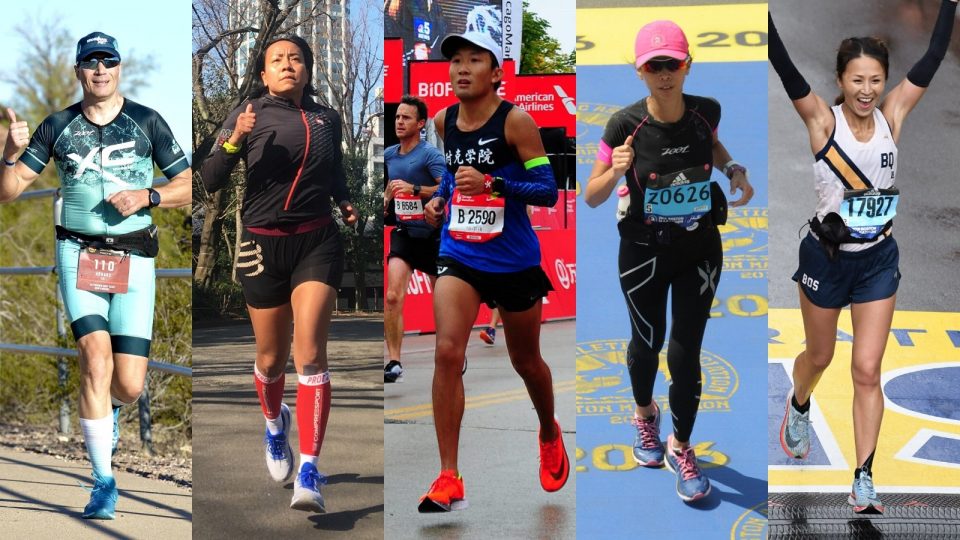The Boston Marathon is a big deal to many runners. Runners from all over the world aspire to earn a ticket to the world’s oldest annual marathon.
Some of the reasons why the Boston Marathon is so unique is that it’s a qualified race. In other words, in order to register for the race, you must have already run a marathon at a particular fast pace.
Despite Boston Marathon being a race that requires a qualifying time, it’s achievable for non-elite runners. This gives many of us a chance of running alongside the absolute best runners in the world.
To make full use of the chance, you will need to train hard for it though. Today, we are extremely pleased to introduce you our five avid Boston Alumni as they share with you all the nitty-gritty about the training for the Boston Marathon.
You will be able to see how the Boston Marathon changes their life once they crossed the finish line. Not only just that, they will be showing you guidance along the way.
What is Boston Marathon?
The Boston Marathon is an annual marathon race hosted by several cities in greater Boston in eastern Massachusetts, United States. It is always held on Patriots’ Day, the third Monday of April. The event was inspired by the success of the first marathon competition in the 1896 Summer Olympics.
What is the requirement to get qualify for the Boston Marathon?
The qualification time for Boston has been changed over time and the qualifying standards has become harder over the years.
You will need to check the rules and regulations time by time. To get a confirmation to qualify in Boston Marathon, you must directly contact the race you wish to qualify, and to check if they have a current certification.
However every year, runners who qualified for the race within a couple of minutes of their time standard wonder if it will be enough to get them into the race.
Tips to qualify for Boston Marathon
Getting qualify for Boston is not an impossible dream, as long as you are well prepared ahead of time.
These useful tips might help you along the way to get qualify for it.
Running workouts & easy runs
You can go for run training such as one long run, one tempo run, and one track workout. As for recovery or easy run, you can do two or three slow runs.
Strength training
Incorporating strength training in your running session is vital as it can enhance your running performance in order to achieve the marathon timing.
Diet
Healthy eating is the first thing before running workouts. You will need to fuel your body with nutritious foods during your training session.
No matter how hard you train, without the right caloric intake, energy, and nutrients in your body, it is impossible to exercise effectively and achieve your fitness goals that you desire.
Best races to qualify for the Boston Marathon
- Bank of America Chicago Marathon
- London Marathon
- New York City Marathon
- Berlin Marathon
- California International Maraton
- St George Marathon
- Phoenix Marathon
- Philadelphia Marathon
Hear from Boston Alumnis
1. Rachel Leung
Bio: Hongkonger, 36 year-old, Designer. Boston Alumni (2019)
Rachel has started running since high school, from 1500m to 42.195km. To her, running is a meditation and a time for herself to distress and it brings her joy.
Running has also become a lifestyle, as well as travel for her to explore wherever she visit places by running. The sport has also changed Rachel’s life and bring her friends, opportunities, and her partner in life.
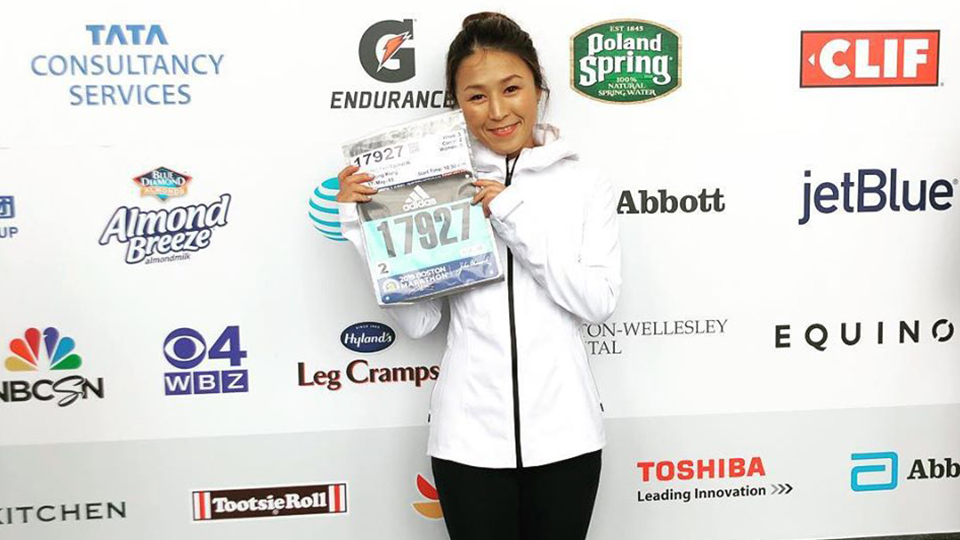
RS: Can you share with us your experience of running the Boston Marathon?
Rachel: This is my 3rd in one of my 6 majors. Boston marathon is the most historical marathon, and needs a qualification to get in. To me, it is like an Oscar in running. It has been my goal to crush in running for a long time.
RS: How do you prepare and train to qualify for Boston?
Rachel: A program for amateur athletes is important, that will be running partners and friends. I joined a training group for 2 years (2 nights a week), after working hours with the encouragement from my coach and training buddies, and self discipline everyday etc. The effort definitely paid off. (I also do trained 5 days a week.)
RS: Once you got in, how do you prepare for the Boston Marathon?
Rachel: The Boston Marathon is on April after Hong Kong Marathon (late Jan). So, I treated Hong Kong Marathon as LSD, and tuned the program I used to do according to my schedule.
I trained 5 times a week during the hot summer in Hong Kong, which the training is divided into 5 parts (intervals for speed, tempo run for speed, endurance, LSD for endurance, recovery run for recovery as well as dealing the mileage, cross training for building up the muscles for running.
Since Boston is not a flat, I also trained running up the hills for strengthening the uphill muscles. it is also training of the mind in patience and perseverance.
RS: Can you share with us your most memorable experience in the Boston Marathon?
Rachel: Scream tunnel, the scream is real, the atmosphere is the best one that I’ve experienced so far.
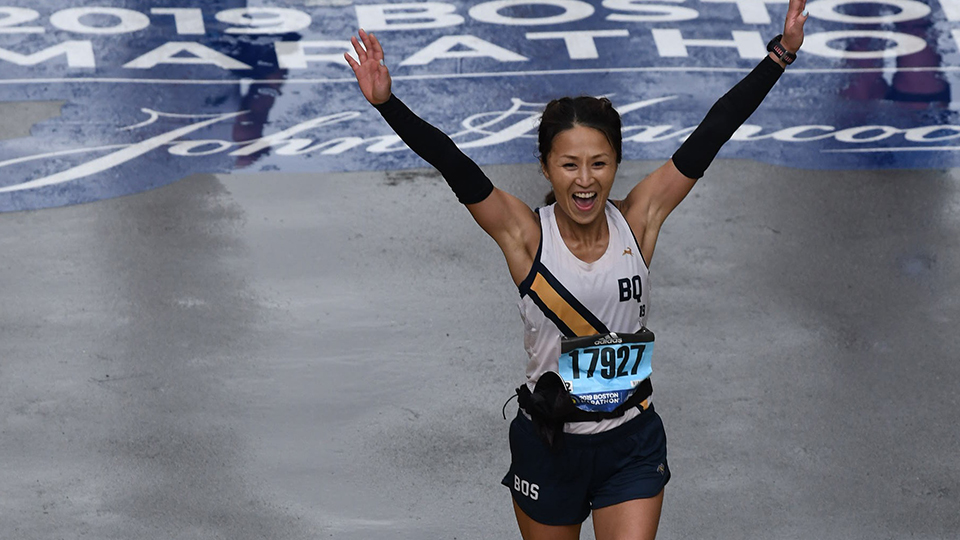
Running becomes a meditation for mindfulness, stress release and also building faith in believing the training is a process.
RS: How has things changed for you after the Boston Marathon?
Rachel: When I thought back the effort and time I have invested to get qualified for the Boston Marathon, it makes me think that “No Pain No Gain” is true. I would work hard for the marathons I have registered.
RS: What is your running goal after the Boston Marathon?
Rachel: Completing the 6 majors and a personal best is my current goal. Long time goal is to keep running, read more about nutrition for athletes, and inspiring more people.
RS: What are the best tips to share with others on how to train for the Boston Marathon?
Rachel: Whatever effort you have put in, it’d be worth it in the end. One bad training does not equal or affect the whole training. Don’t give up and take enough rest is also part of the training. Training is a process, try to enjoy it. As well as, eat and sleep well.
RS: What does running a marathon means to you?
Rachel: Running a marathon is a self discovery. Through my years of running, there are a different goals at times/stages, just like in life there are various goals that are in hopes to achieve.
It is a self-discovery since there are challenging moments which I’d need to overcome, such as negativity in not achieving the pacing to be trained, accepting injuries and failure.
I have also discovered that running becomes a meditation for mindfulness, stress release and also building faith in believing the training is a process; if you set a goal and work hard on it, it is achievable.
You can follow Rachel on Instagram: @rachel17
2. Cheung, Kin Hang Thomas
Bio: Hongkonger, 31 year-old, Civil Engineer. Boston Alumni (2019)
Tomas started running around in 2007 as a cross training to Taekwondo. From time to time, he had joined 10 km to 21 km competition. In 2013, he had joined the Ultimate Marathon Training 3.0 organised by Nike HK Ltd.
After review, training and tests in 2016, Tomas have been selected to be a Nike Pacer to lead the pacing in the regular NRC session and also to take part in the HK marathon as an official pacer.
He made a great success in HK marathon 2019 and provide pacer service for the full marathon category. He was one of the Pacer to lead the runner to cross the finish line within 3 hrs 30 mins.
Thomas started his 6 majors marathon journey from 2018 and completed 4 of them so far, including Tokyo Marathon, Chicago Marathon, Boston Marathon and New York Marathon.
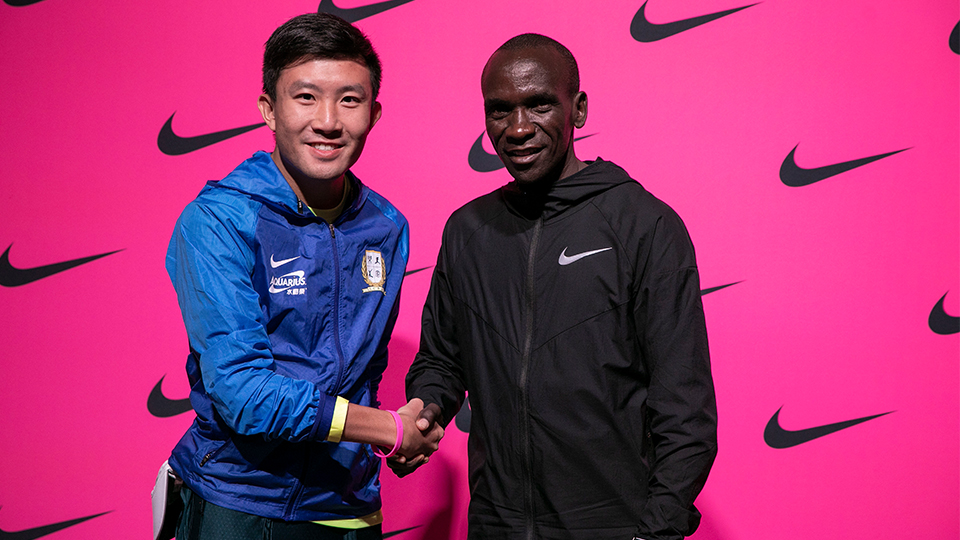
RS: What inspires you to go for the Boston Marathon?
Thomas: The Boston Marathon is a holy place of citizen runners and the world’s oldest annual marathon. The race is also iconic because you have to qualify and means someone have run faster. Therefore, this is my dream to join this race.
RS: How do you prepare and train to get qualified for Boston?
Thomas: Although I am a pacer and a runner. It is my pleasure to help other runners to break through their personal best. To break through my barrier, I joined a local running club called “Love and Care Running Association” held by HK famous running athletes Chan Ka Ho and Yiu Kit Ching (Kit Ching is the HK representative in the women’s marathon at the 2016 Olympic Games in Rio de Janeiro).
I start to learn how to train as a professional runner that include the interval, tempo, strengthening workout and long distance. Moreover, I trained with HK marathon female representative, Wong Tsz Yan as well. Before running my qualified marathon,
I had carried out an ultimate long distance training up to 36 km. Not just only learning about the running technique, but also athlete attitude, courage and persistence. Moreover, running is not a hero sport, but teamwork.
RS: Once you got in, how do you train for the Boston Marathon?
Thomas: I need to lead pace in the HK Full marathon, which was 2 months before the Boston Marathon. First of all, I need to build up the speed during the summer and increase the mileage from week to week along with speed run, target speed run, tempo and long distance run.
As we know, the Boston Marathon is not a flat race, runners are required to brave the hilly Massachusetts terrain and varying weather to take part in the race. The coach will ask us to carry out ladder training, run up to the hill and run tempo with ups and downs road, in order to build up the muscles to run up the hill.
Meanwhile, we will carry out training as usual, no matter heavy raining and strong sunshine. So that, you can encounter the four seasons weather during the Boston Marathon.
RS: What is your most memorable experience in the Boston Marathon?
Thomas: The most memorable experience was the cheer and support of the crowd. They cheered all along 42.195 km without stopping and even I can’t hear my breath when I run to the Boston City. It is so impressive and touching that the whole city enjoy the race.
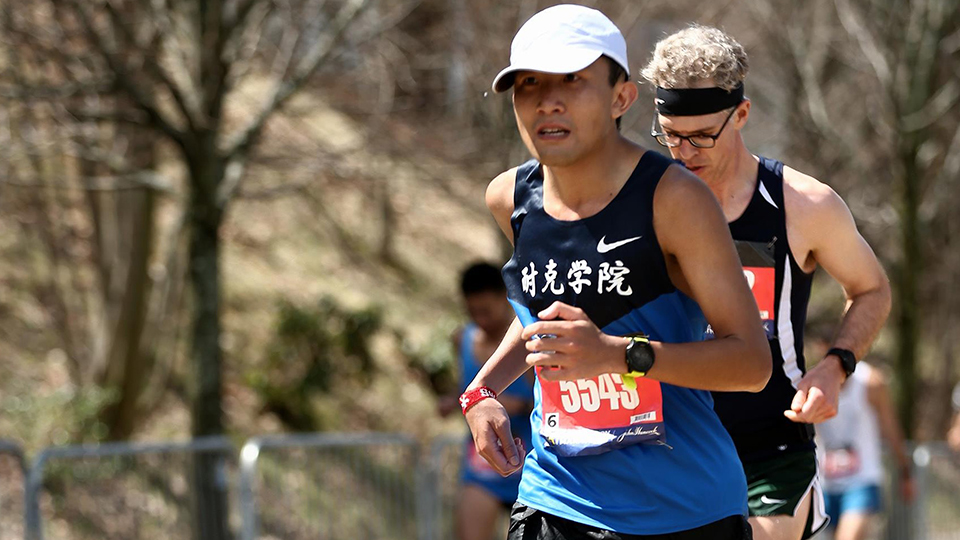
Self-discipline is like building your muscle. Make discipline your lifestyle.
RS: How has things changed for you after Boston?
Thomas: This race makes my mind stronger to run faster. Also, sharing my experiences to runners or even non-runners, it helps them to reach their target.
RS: What is your running goal after the Boston Marathon?
Thomas: My personal best in full marathon is 3 hrs 00 min 02 s. I would like to break through 3hrs barrier and join the Boston Marathon again. As Eliud Kipchoge said “No Human is Limited”. Thus, I will not limit in my running goal.
RS: What are the best tips to share with others on how to train for the Boston Marathon?
Thomas: Make discipline your lifestyle. Discipline is not a one-time event. Self-discipline is like building your muscle. It’s like going to the gym. You can not go to the gym today and build your muscle. You should join a program and go slowly by slowly. That’s the way to build your muscle and discipline.
Don’t make excuses. When you decided to do something, do it. Then you are self-disciplined. In any profession, you should think positively. That’s the driver of your mind.
If your mind is thinking positively, then you are on the right track. Pleasure in what you ’re doing puts perfection in your work.
RS: What does running a marathon means to you?
Thomas: The world is full of challenges and we need to challenge ourselves. I took the challenge to run that fast. It consumes a lot of energy, especially mentally. But I took up the challenge and accept to get challenged as well as, challenged the time.
You can follow Thomas on Instagram: @thomas_kh_c
3. Arnaud Despierre
Bio: French, 47 year-old, Singapore PR, Retired. Boston Alumni (2018)
Arnaud has lived in Singapore for the last 13 years working in business consulting and retired a few months ago to focus on running and sports. His goal is to complete marathons in 40 different countries before he turns 50. Right now, he is up to 14 countries so far, with under three years to go.
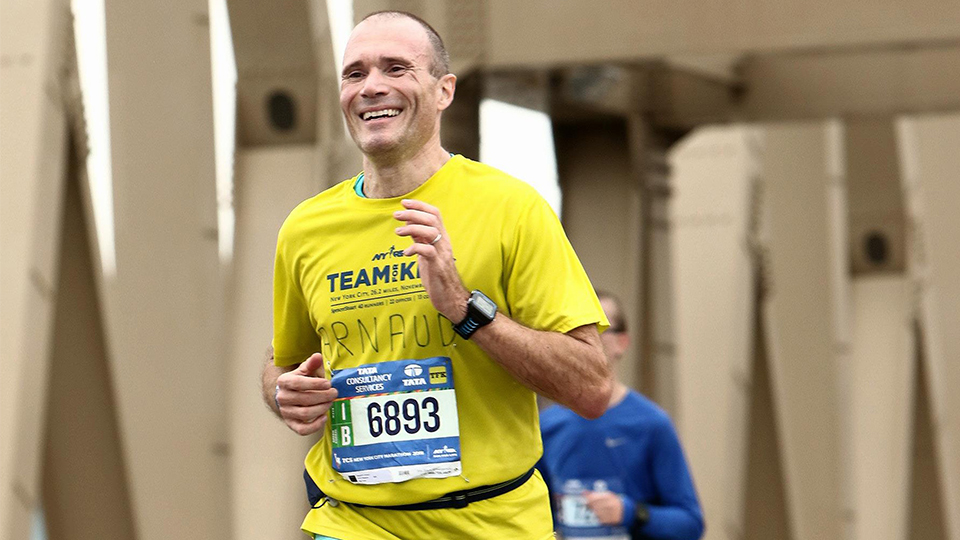
RS: What inspire you to go for the Boston Marathon?
Arnaud: Ever since I started running I heard that the Boston marathon is the pinnacle of the running world. It is the marathon race with the oldest history, and it quickly became an objective of mine to qualify and run.
In addition, I wanted to complete all six world majors, so Boston was a given (it ended up being #5 of the 6 for me, and I completed the World Majors six days later in London).
RS: How do you prepare and train to get qualify for Boston?
Arnaud: I did not follow a specific training plan for BQ, other than trying to do optimise my training to be as fast as possible on any race day.
I tried first in New York 2015 and managed to beat my BQ time by two seconds, but this was not enough to qualify as that year you had to be about 1 min faster than your BQ target.
I paused for a year and waited for 2017, as I went up in age group. I was then able to qualify for Boston with a fairly comfortable margin in Paris 2017.
RS: Once you got in, how do you train for the Boston Marathon?
Arnaud: For me, Boston was only a race to compete in the calendar, as I had many other races in 2018 – several other marathons (including London the following weekend) and Ironman races.
I prepared like I would prepare for any other marathon with a couple of months of solid run training, but I had no intention to go for a PB so I passed the training reasonably, as well as the race.
My objective was to enjoy the atmosphere and the crowds, and to build some good memories. Except for the terrible weather we had, I managed to accomplish all that!
RS: What is your most memorable experience in the Boston Marathon?
Arnaud: The thing that stood out for me in Boston was the unusual cold weather we had for the race. By all accounts this was one of the coldest, if not THE coldest, Boston marathon on record. We had light snow on the start line, which turned into constant rain all the way.
In addition Boston is a point-to-point race more or less in a straight line, and we had strong headwinds for 42km. As a result, that year for the first time in many decades, the African runners did not win either the male or female race.
Once you get to the last couple of miles, with crowds cheering, you forget the cold and really get immersed in the experience and the spirit of this amazing race.
One thing you hear a lot about Boston is Heartbreak Hill, how it is supposed to be so tough close to the end of the race. I was really looking forward to it, but never noticed it – yes sure there are a few bumps along the way towards the end, but I guess I was expecting something more dramatic!
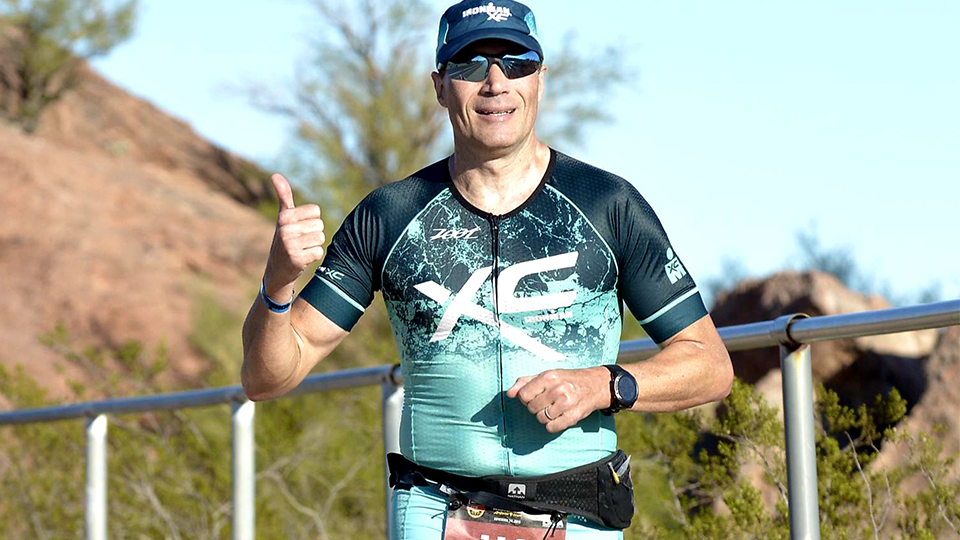
By running a marathon, it is fun to visit a new country along the way.
RS: How has things changed for you after Boston?
Arnaud: My main takeaway is being able to say “I have done it”. It was probably more emotional for me to complete my sixth World Major in London a week later, as I had been working hard on this marathon series for 3.5 years.
RS: What is your running goal after the Boston Marathon?
Arnaud: At this stage, my next big goal is complete 40 marathons in 40 countries in my forties. I have covered 14 countries so far (Australia, China, France, Germany, Japan, Korea, Malaysia, Norway, Peru, Qatar, Singapore, South Africa, UK, US) and I have less than 3 years left to run the other 26. I must run and travel more!
RS: What are the best tips to share with others on how to train for the Boston Marathon?
Arnaud: Qualifying for Boston often takes both commitment and luck. If you are a runner “on the cusp” when it comes to meeting your BQ time, you need to pick a race that works to your advantage – often a flat race in a cool climate.
Unfortunately, that means Southeast Asia is not the best place for it, but a race trip to Australia for instance can make a big difference.
You should also be strategic regarding your age group. If your BQ target goes up 5 or 10 minutes with just one more year, it is probably worth the wait.
Finally, the qualification window in Boston starts in September, 18 months before the race – pick a race early in that time window, and then keep in view a couple of backup races later in the season.
RS: What does running a marathon means to you?
Arnaud: It is a good way to pick an interesting new city or country to visit!
You can follow Arnaud on Instagram: @2020runningman
4. Laura Koh
Bio: Singaporean, 46 year-old, Home maker (just started in Jan 2020). Boston Alumni (2016)
Laura’s running journey started when her daughter broached the idea of wanting to do a triathlon in 2012. She decided that they should train together for a run first and so, they signed up for their first Great Eastern women’s run in Nov 2012.
It was through this maiden 10km run that she got hooked by the adrenaline derived from the run. There was no turning back after that.
She was never a sporty person before that and after 2012, she took up running more seriously and by 2018, and she is proud of herself.
Laura has completed all six Abbott World Marathon Majors (AbbottWMM) marathons in London, New York, Chicago, Berlin, Tokyo and Boston, and was recognised as a Six Star Finisher – which is something she is still very overwhelmed by.
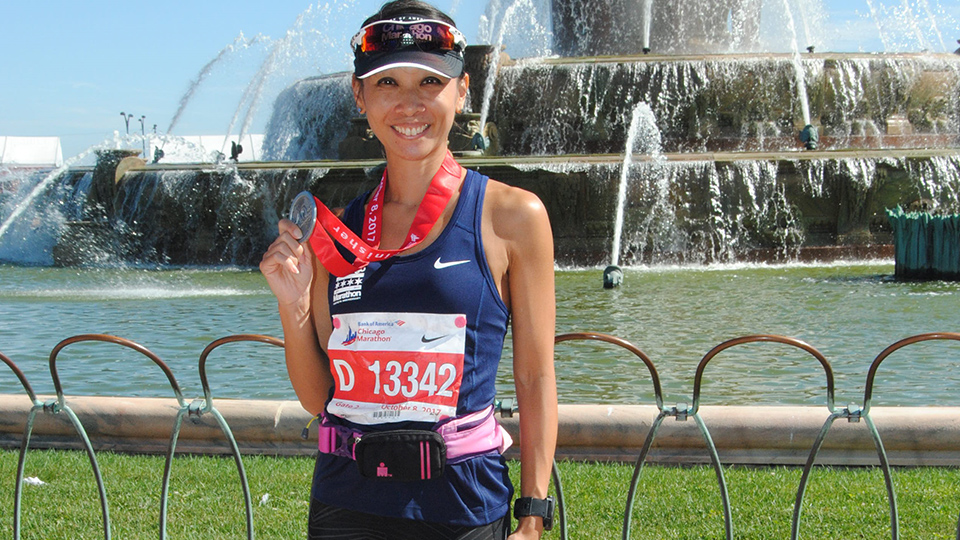
RS: What inspire you to go for the Boston Marathon?
Laura: I had a ballot for my first major marathon, which is the Tokyo Marathon in 2015 without knowing it is a major.
It was during the race packet collection at Tokyo expo, I came across the six star finisher medal. It was there and then that I decided to embark on the six star journey.
RS: How do you prepare and train to get qualify for Boston?
Laura: Honestly, I did not know what the qualifying time to be qualified for the Boston Marathon when I did my Tokyo Marathon in 2015. I was just lucky that my Tokyo marathon timing enable me to qualify for the Boston Marathon in 2016.
RS: Once you got in, how do you train for the Boston Marathon?
Laura: Unfortunately, before my Boston Marathon I sustain a hip injury from doing yoga. I did most of my training in the pool doing aqua running.
RS: What’s your most memorable experience in the Boston Marathon?
Laura: Just being on the start line, it was the most memorable experience. There is a sense of proudness when you stand at the start line to be able to run the Boston course. The atmosphere was electrifying!
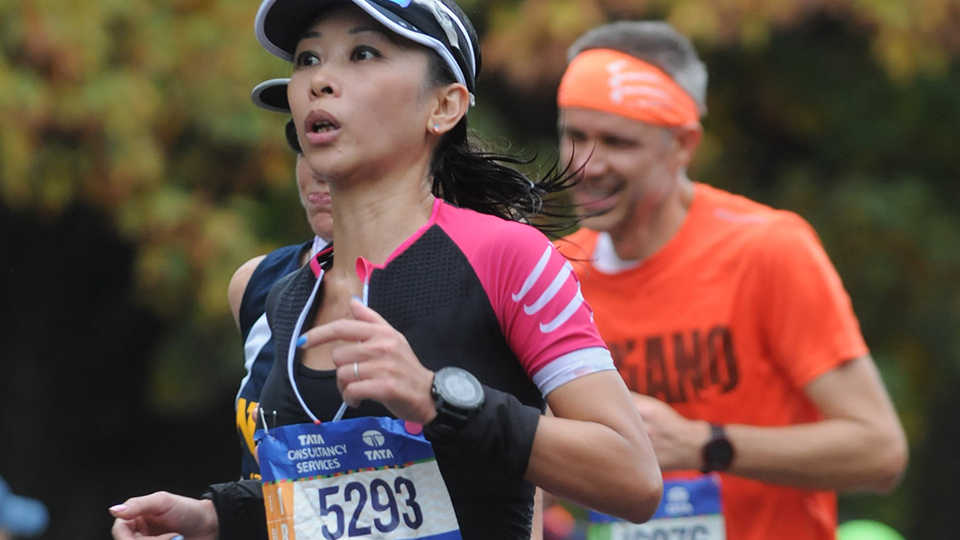
Running a marathon is about the training one’s mind and character building.
RS: How has things changed for you after Boston?
Laura: After the Boston Marathon, my training took a new prospective. I told myself to train hard, but smart. Since the Boston Marathon was my second major, I had a long way to go to complete my six majors.
RS: What is your running goal after Boston?
Laura: To enjoy my running journey while chasing down the other 4 majors through ballots.
RS: What are the best tips to share with others on how to train for the Boston Marathon?
Laura: Be consistent with training and remember to train smart and stay injury free. Hill trainings are important as Boston course is rolling hills.
RS: What does running a marathon means to you?
Laura: Running a marathon is about the training one’s mind. It is mind over body and it really shows how powerful our mind is when we set ourselves through the race. To me, it’s a lot of character building.
You can follow Laura on Instagram: @_laurakoh_
5. Riena Tambunan
Bio: Indonesian, 45 year-old, Occupation Race Director. Boston Alumni: 2017
Graduated from Sport Medicine, Riena becomes a personal trainer since she can’t afford to hire a personal trainer when she lived in Australia.
She loves sport since she was very young. As her father proposed to her to become a professional athlete. She refused because in her generation, athlete has nothing in life.
But, subsequently she fell in love with running as she love running since she was young.
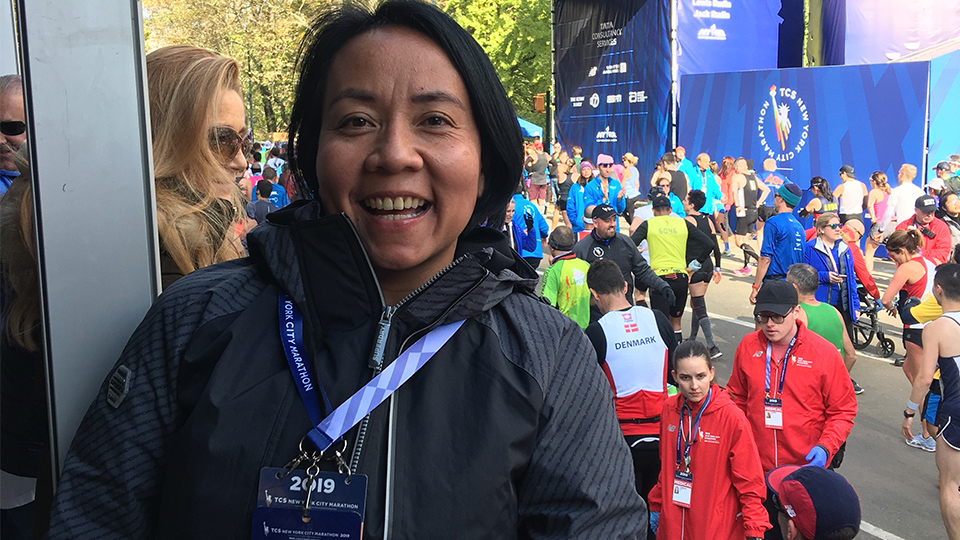
RS: Why do you want to go for the Boston Marathon?
Riena: I never dreamt about running in the Boston Marathon before, but since I am a race director and I know who to look up to. I want to learn from all the best marathon in the world. I know Boston isn’t only about running, but it’s a history.
RS: How do you prepare and train to qualify for Boston?
Riena: I am committed to my training 6 months in prior. I am very honest to my training log. Once I failed to fill the log, I have to lower my expectation.
RS: Once you got in, how do you train for the Boston Marathon?
Riena: My training for the Boston Marathon is about 5 days a week. It includes long and tempo training, and also swimming and yoga. I did my training with “runners connect”, they are very reliable and push me in a good positive way. I am always clear with my daily situation.
RS: What’s your most memorable experience in the Boston Marathon?
Riena: I was on TV, together with Kathleen Switzer because, we finished the race together. It was a memorable moment for me, because in my Boston class, we had a movie which is about Boston history.
Since you are in that place, you will get the hype as it is a great city where you meet many runners from all over the world. You know that they are coming with their Boston qualified or they willing to pay so much money to run this marathon.
Almost every day during race week, runners are everywhere and you get the chance to meet so many elite athletes.
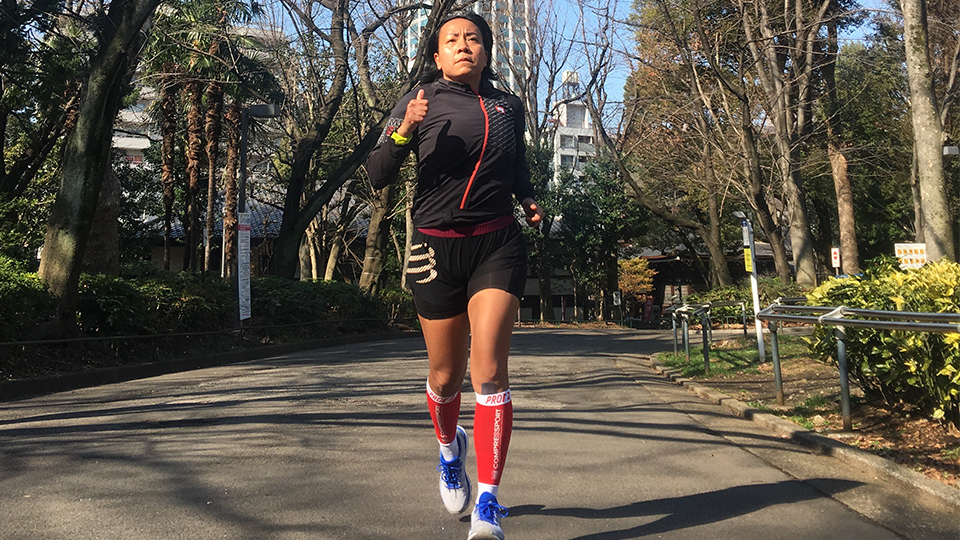
Running a marathon is my remedy from my busy life and commitment to myself.
RS: How has things changed for you after the Boston Marathon?
Riena: I appreciate my life and training. I still can’t believe it that I ran Boston.
RS: What is your running goal after the Boston Marathon?
Riena: I want to keep running as it is my lifestyle. I do boxing, but running is always wonderful to me. I am planning to join Honolulu Marathon in December and also it because of my working schedule.
RS: What are the best tips to share with others on how to get qualified for the Boston Marathon?
Riena: Run at your own pace and don’t rush. Enjoy the process. “There is no perfect race.” just like how my former running buddy said. I know that if you prepared well with sleep, nutrition, stress level and works and family. You should be proud and take your time.
RS: What does running a marathon means to you?
Riena: It’s my remedy from my busy life and commitment to myself. Running a marathon is my way to stick to my nutrition, diet, controlling myself not too much engaged with social media (I need sleep) and also I appreciate my times with family and works, because limited time we have everyday.
You can follow Rina on Instagram: @rienatambunan
Push your limits for a higher chance of Boston qualification
If you’re hoping to qualify for Boston 2020, you will have to run at least five minutes faster than the recent qualifying times. Running a fast marathon is not all about running fast in training.
If marathon planning and training sounds a little overwhelming, hiring a coach can help you achieve your goals and remain injury free.
If you are dying to run the Boston Marathon, but can never get in for whatever reason, why not join the Run To Boston online marathon first? It’s at least a consolation that you can get!
Are you ready to compete in the Boston Marathon? Share with us the reason on why do you want to run in the Boston Marathon in the comments.



